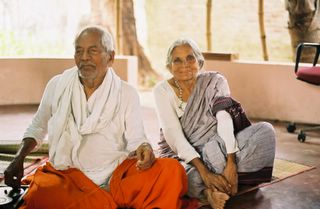Land for 1,010 families!
The new Chief Minister Karunanidhi made a campaign promise of “two acres and a television set” for every landless family. Now where he is to get the television sets is anyone’s guess (and, in some areas, electricity is still intermittent – my fan at Gandhigram is still going on and off every few hours). There are government-owned wastelands in certain areas of the state, but certainly in the rich rice-growing areas in which LAFTI works close to the coast.
But, at any rate, the state government approached Krishnammal about taking over privately owned lands for the landless. They asked LAFTI to negotiate with landlords for the lowest possible price (knowing full well that if they did it themselves, the price would be inflated, and likely that there would be a huge amount of corruption in the bargain.)
Many of the wealthy landlords would prefer to make their assets more liquid. The reality is that globalization has hit them with a vengeance as well. Inputs for irrigation, diesel fuel for the tractors, etc. have skyrocketed, while the price of agricultural commodities has taken a hit, and many of them would prefer to be in California if they could somehow manage it.
Krishnammal has a relationship with the landlords extending back almost 40 years, if only as opponents in a long struggle. In one area – Kilvenmani – these are the same landlords guilty of having killed dozens of women and children. So in some sense, selling land to her is act of expiation. “They’ve taken to calling me a Mother Theresa,” Krishnammal says with a smile indicating that she doesn’t care what she is called as long as their land.
To make a long story short, land that would should have cost 50,000-55,000 rupees ($1,100- $1,300) an acre is being purchased for 33,000 rupees ($800 or so.) Half the funds are being supplied as grant by the government, the other half to be paid for with low-interest loans set aside for the “scheduled castes” (Dalits – “untouchables”.)
Ah, but it is not so simple as that. It never is. Having identified 1,010 landless families who have worked this same land for scores of generations, there is the problem of making it all legal. The government requires an “income certificate” certifying the families are landless laborers, a “native certificate” signed by a village office attesting that the family lives where they do, a “caste certificate” signifying the same. There needs to be affixed two maps: a landowner’s map, marking the borders of the land (which, unfortunately, is measured in hectares), and a village map, assigning the land in acres, one acre per family. All must have the appropriate government stamps and codicils attached.
And this is the part foreigners don’t often see. LAFTI’s field staff (none of whom speak any English, and who rarely show up at the office) have been working non-stop to get all the agreements and paperwork in order in two weeks! They’ve hired four retired village officers to attest to all the certifications, prepared a binder for each of 1,010 parcels of land, each of which will be assigned in ownership to the woman of the family.
It is an extraordinary piece of work, and, they feel it is has to be, because they know all must be accomplished before the political winds blow in another direction (which could happen at any time.)
With a very few exceptions, LAFTI’s staff each earn 2,000 rupees a months (roughly $47). The total budget for staff is not much more than $30,000 U.S. per year, but they are extraordinarily stretched. While it has been relatively easier to attract funding for special projects from abroad over the years, funding for the day-to-day work of organizing in communities has been very difficult to come by. Hey, that’s much of the reason I’m here – to help figure it out. There is much work to do.
Meanwhile, Krishnammal says that following David Willis’ wedding tomorrow in Madurai, she is taking me on a whirlwind trip to Chennai; there are still papers to fill out, she could use a companion, and Sathya and Bhoomi are happier when she doesn’t travel alone. “I don’t see why that’s a problem,” she says, “I may not own a rupee, but if I need food, everyone knows me and will give; if I need clothes, there are always folks prepared to give me their old sarees, and I don’t need much more than that.” I nod, noting that I am wearing a dhoti purchased in 1981.
At any rate, looks like I’m headed out on an exciting adventure!


1 Comments:
Hey David
It worked! You can now use the email account we talked about. I will not download from that webmail and I will forward any emails you might want to see. I hope David and Mika like the wedding present.
Ellen
Post a Comment
<< Home